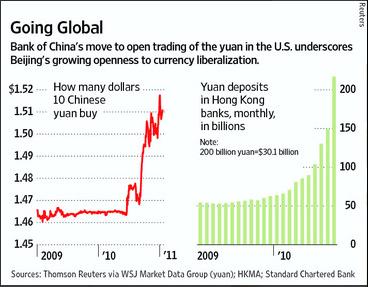According
to bankers and traders China's policy of gradually freeing up trade in
its currency could mean that commodities are paid for in yuan within a
decade
Posted: Thursday , 26 Apr 2012
Gold, copper and other commodities could be paid for in yuan within a decade or two, bankers and traders said on Wednesday, provided China pursues its policy of gradually freeing up trade in the currency.
Already the world's biggest consumer of commodities such as industrial metals and oil, China's economy is growing more than three times faster than most developed countries.
Chinese customers and end-consumers such as refiners and fabricators now typically pay for such imports with dollars, but bankers at a Financial Times commodities conference in Switzerland think that will change, possibly quite rapidly.
They expect the yuan, also known as the renminbi, to be used increasingly to settle contracts into China and eventually as the basis for commodities trading, at least in Asia.
"There is a great push of the renminbi by China's government," Jean-Francois Lambert, managing director and global head of commodity and structured finance at the HSBC (HSBA.L) banking group, told Reuters.
Beijing has taken a series of steps in the past two years to promote international use of its currency, notably by allowing exports and imports to be settled in yuan. A thriving yuan deposit market is developing in Hong Kong as a result.
Earlier this month China underscored its intention to keep liberalising its currency regime by doubling the yuan's daily trading band to 1 percent.
Bankers say use of the yuan, which closed on Wednesday at 6.3041 per dollar, is growing as more suppliers trade directly with Chinese companies.
"Not yet, but it is possible in the future that it will be a commodity currency for trade. Certainly, it will be in 15-20 years' time, maybe long before," Lambert said.
"Whether this will lead to commodities actually trading in renminbi on international markets, we don't know. We are certainly not there yet at all," he said.
"REAL PRESENCE"
Edward George, a specialist in soft commodities at Ecobank, which specialises in African investments, said the yuan would continue to be held back as a currency of choice until it could move freely on international markets.
The yuan is not convertible for purely financial purposes unrelated to trade and investment.
"But if the Chinese government wants to do a cobalt deal in return for services, they will use renminbi," he said.
Traders and bankers in Lausanne told a similar story.
"Trade in renminbi has been expanding faster than anyone anticipated," said Harris Antoniou, the global head for energy, commodities and transportation at Dutch bank ABN AMRO ABNNV.UL. "Long term, in say 10-20 years, it's going to have a real presence."
HSBC's Lambert agreed that China's role as the world's biggest commodities importer meant the yuan would be used increasingly as a settlement currency.
The Financial Times reported last week that the London Metal Exchange was considering offering traders the chance to settle its contracts in renminbi.
"Definitely you will see the renminbi become more and more important for all types of trade," Lambert said. "If you compare the situation now with two years ago, there has been huge growth and development. It is growing far faster than anyone believed."
(Additional reporting by Alan Wheatley; Editing by Ruth Pitchford)
